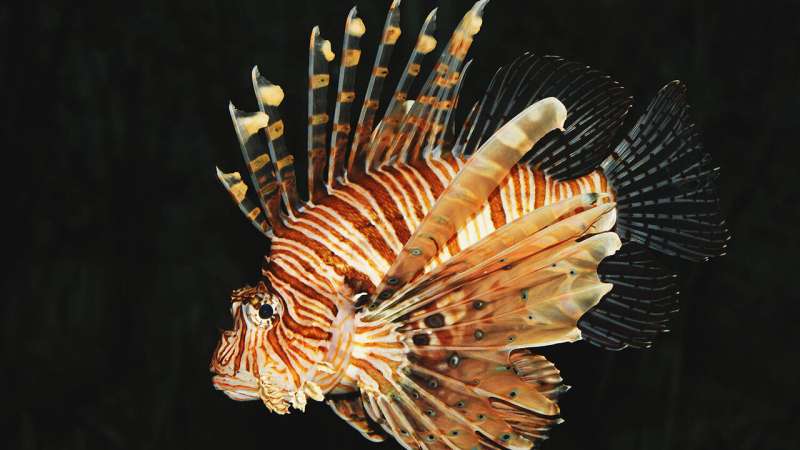Lionfish genes studied for clues to invasive prowess

What makes the red lionfish (Pterois volitans) such a successful and powerful invader in Atlantic Ocean waters compared to its rather lamblike existence in its native Pacific Ocean?
A new North Carolina State University study examining two native lionfish regions in the Pacific and five invading regions in the Atlantic showed the greatest genetic similarities between lionfish in the region of Taiwan and the Bahamas, suggesting a population near Taiwan was the source of the invading species.
Lionfish were introduced to the Atlantic in the mid-1980s, most likely as the result of a marine ornamental aquarium trade. In the Atlantic, P. volitans acts differently from the native Pacific species. Known to be shadowy and furtive in their native Pacific waters, lionfish—freed from Pacific predators—become voracious predators in the Atlantic, responsible for massive reef fish kills, devastating economically important grouper and snapper. Plus, they rival rabbits in procreation.
"P. volitans has a lot going for it in Atlantic waters," said Martha Burford Reiskind, research assistant professor of applied ecology at NC State and corresponding author of a paper describing the research. "They are found at high densities and in some cases can spawn every four days in the Atlantic; their eggs can travel great distances on ocean currents, exacerbating their spread.
"They are also difficult to handle because of their venomous spines. The population has grown so large that controlling it, not eradicating it, is the primary goal."
Besides learning more about important gene regions that show evidence of rapid evolution when the species arrived in the invasive range, the researchers also examined whether Atlantic or Pacific lionfish may be hybrids, or combinations, of two lionfish species. Specifically, researchers wanted to know if P. volitans had merged with P. miles, the devil fire fish.
"We didn't find any evidence of P. miles or hybrids in our Atlantic Ocean samples," Burford Reiskind said. "But we can't rule out that the fish introduced to the Atlantic from the Pacific wasn't already some type of hybrid between an Indian Ocean and a Pacific Ocean species."
Burford Reiskind said that the study could help during other invasive events.
"Some of these invaders rapidly adapt to new surroundings. What are the genes that allow them to successfully invade?" she asked. "Can we make better predictions so that invasive species like P. volitans are eradicated before it's too late?"
The research was conducted by undergraduate and graduate students in a conservation genetics course taught by Burford Reiskind. In this experiential-leaning project, students collected samples, sequenced DNA, built genomic libraries, analyzed data and served as co-authors of a paper that appears in Biological Invasions.
"We weren't sure what we were going to find when we took on this project as a class," Burford Reiskind said. "It was fun to see the students learn how to conduct genomic studies on an important conservation question."
More information: M. O. Burford Reiskind et al. The genomics of invasion: characterization of red lionfish (Pterois volitans) populations from the native and introduced ranges, Biological Invasions (2019). DOI: 10.1007/s10530-019-01992-0
Journal information: Biological Invasions
Provided by North Carolina State University



















